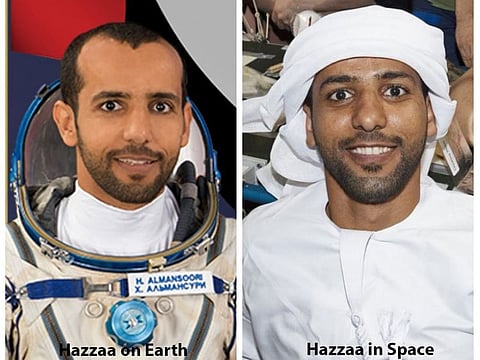Has UAE astronaut Hazzaa’s head grown bigger in space?
Here’s why Emirati astronaut Hazzaa’s head appears bigger, his cheeks a bit chubbier

Dubai: Has Astro Hazzaa gained weight after a week in space? Why is his face a bit chubbier?
Well, we can’t tell for sure now if he has until we get the final weight from his doctor but his face does look a bit chubby. Even the first Emirati astronaut Hazzaa AlMansoori noticed it. And here’s why.
“Many changes [have] happened in my body,” Hazzaa said in a statement. “The size of my head grew bigger because of the rush of fluids upward, and my sense of smell also changed.”
Because of microgravity, it’s normal for fluids such as water and blood to be distributed in the upper and lower extremities of an astronaut, but mostly concentrating on their heads. This is why you will see astronauts with puffy faces or chubby cheeks.
Sometimes, they’d even appear to have bulging veins on the sides of their faces by their temples.
Zero gravity also makes their shoulders and arms appear to be more prominent but that’s only because it is unusually raised all the time. Astronauts sometimes have to hold their hands together to keep their arms from floating away.
In terms of his sense of small which Hazzaa noticed to have changed as well, it’s more to do with the fluids in his head.
Fluids shift
The fluids can shift, including near the nasal cavity, which could give astronauts the sensation of having a heavy cold. T
he sinuses could swell as well that could affect someone’s sense of smell, which in turn affects their sense of taste. This is why some astronauts are reported to be eating less in space compared to when they are on Earth.
Having spent one week in space, Hazzaa’s built looked unchanged from the outside although he will go though a rigorous post-mission medical examination to compare it with his pre-mission results.
Despite this, Hazzaa himself said he has adjusted to living in microgravity. “I began to adapt and get used to it after some time,” Hazzaa added.
Hazzaa has been continuously updating Dr Hanan AlSuwaidi, the flight surgeon for the mission, who is following his medical status throughout his time in space.
As part of his mission, he is also conducting a study on the autonomic regulation of the cardiovascular system.
Prolonged stay in space affects the bone density and muscle mass. And because the heart is a muscle, it also gets affected. Hazzaa and his medical team will check the extent of zero gravity’s effects on the heart for a short-duration flight.
Hazzaa also tested the influence of space flight factors on the spatial distribution of the energy of heart contraction.
After eight days in space, he is scheduled to return to Earth on Thursday with Russian commander Alexey Ovchinin and Nasa astronaut Nick Hague onboard the Soyuz MS-12 spacecraft.
Landing on October 3
Landing is scheduled at 3pm UAE time, according to Nasa. The parachute-assisted landing is planned southeast of the remote town of Zhezqazghan (formerly Dzhezkazgan), which is roughly 700km from the launch site Baikonur Cosmodrome in Kazakhstan.
He will be flown to Moscow for further tests before he flies back to the UAE.
And if you’re curious, the puffiness of his face will go away as the fluids will be redistributed in his body once he is back on Earth.






